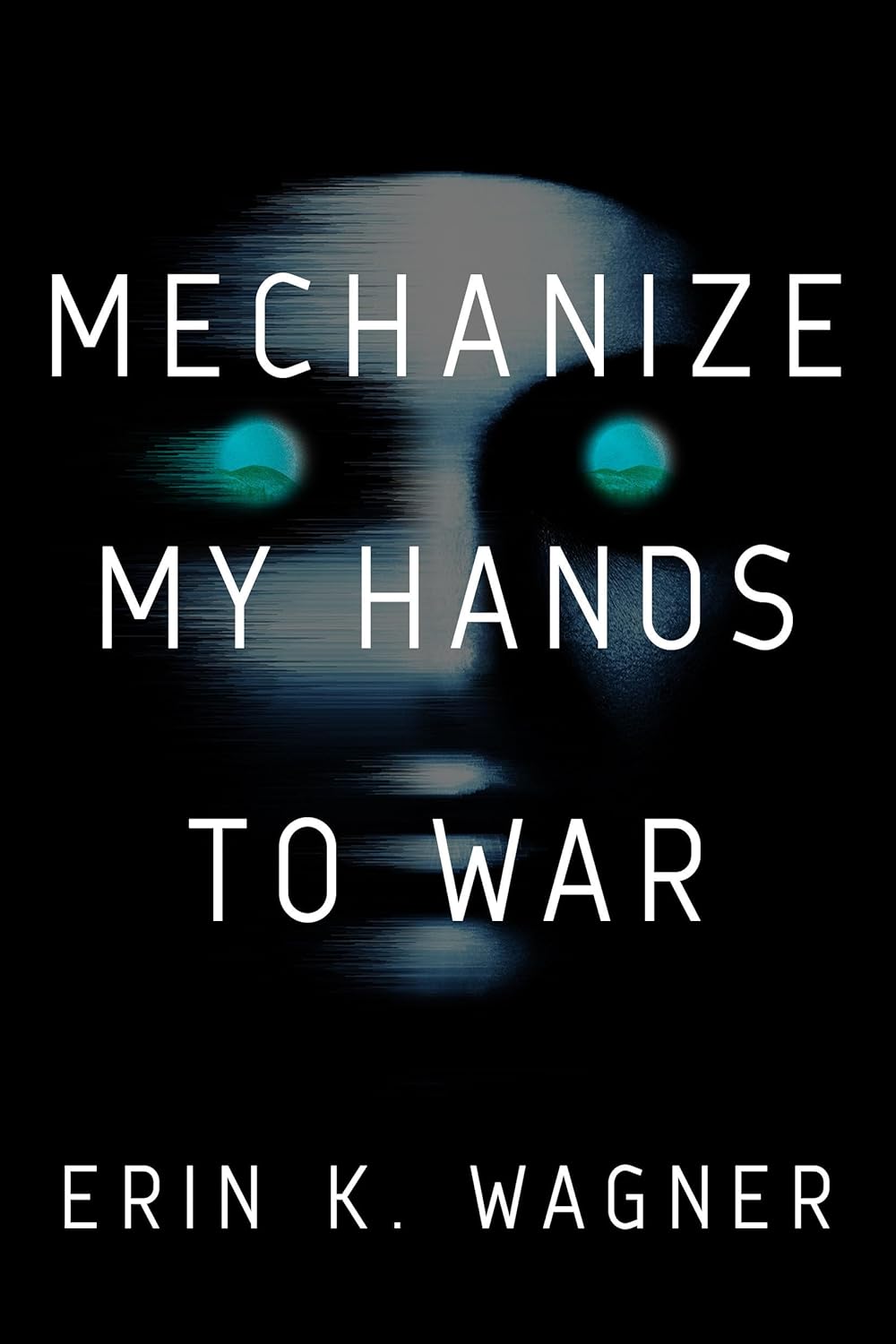Mechanize My Hands to War by Erin K. Wagner.: Review by Niall Harrison
 Mechanize My Hands to War, Erin K. Wagner (DAW 978-0-7564-1934-9, $28.99, 309pp, hc) December 2024. Cover by Faceout Studio, Tim Green.
Mechanize My Hands to War, Erin K. Wagner (DAW 978-0-7564-1934-9, $28.99, 309pp, hc) December 2024. Cover by Faceout Studio, Tim Green.
From a novel in which voice overmasters genre we move to one in which genre more or less overmasters voice. Erin K. Wagner’s debut novel, Mechanize My Hands to War, isn’t badly told or badly imagined per se, but most of what is imagined is familiar and, unlike Smith, the telling is not unconventional enough to make it new. Set primarily between 2056 and 2062, Mechanize My Hands to War depicts a United States in which android labour has become commonplace, from factories to medical care to law enforcement, and yet only minimal economic accommodations have been made, such that a very large number of people are now unemployed and resentful. Some of them have thrown their lot in with the Civil Union Militia, which takes a staunchly, and if necessary violently, anti-android position; the action of the novel circles around the hunt for militia leader Eli Whitaker, and in particular two raids on his compounds, one in July 2060 and another in September 2061. Lest Whitaker be mistaken for a good guy, we see him recruiting, conditioning, and deploying child soldiers to fight his fight, one of whom is killed by an android in the 2060 raid, sparking a wave of public recrimination and anxiety.
Each of the novel’s close-third-person chapters takes up a different perspective – including individuals on either side of the conflict, and some that speak to the larger position of androids in this society – and gives us several snapshots from their personal timeline. In the third chapter, for instance, we follow field agent Trey Caudill through the 2060 raid, and through a more successful operation in February 2061 in which a young girl is rescued from Whitaker’s militia, to January 2062, by which time he has taken up a new role in adoption services, trying to find homes for the former soldiers. We realise that the farmers he visits are a couple that we met in chapter two, dealing with hard times in 2058-2059, and in the next chapter we encounter the girl soldier, Lia, and live through her journey from hunting with her father in October 2057, to signing up to Whitaker’s crusade, to her perspective on her encounter with Trey in 2061. The structure rewards attention, to a point; information is dispensed in precise aliquots, and the alternate perspectives intermesh in a satisfying way. But for me the underlying debate, unfortunately, remained rather sterile.
Several of the chapters give us android viewpoints, either soldiers, including the one responsible for killing the child soldier in July 2060, or nurses, or more general workers. It is quickly clear that the androids are sentient, with feelings and desires and curiosity that are to varying degrees circumscribed by the humans who have programmed them out of, essentially, fear. Ora, for instance, the earliest-developed model that we meet, appears to have the highest capability for abstract reasoning, but is artificially muted and can speak only in single words (as in, to acknowledge orders); later models are able to speak more fluently, but think less freely. These androids are, in other words, part of science fiction’s lineage of metaphorized Others, a perfectly valid tradition, but one that has little to do with how actually occurring developments in artificial intelligence might displace human jobs, making the future history feel disconnected from our present. A key plank of the novel’s argument is that people mistakenly direct their hate at the androids, when they should be targeting ‘‘the businesses who use them, the people who make them’’; in our timeline, without an embodied target, I’m not sure discontent will be directed at apps. What Wagner’s framing does echo, of course, is historical situations involving immigration and slavery, and the scapegoating of minority labour seems entirely plausible, but that line of thought only makes you notice how little role race and ethnicity play in Mechanize’s narrative; almost all of the human characters are almost certainly white, and none of them ever reflect on how their heritage might inform their experience, or their views on androids. Instead the debate focuses on the parallels between the (real) atrocity of brainwashing child soldiers and the (safely abstract) atrocity of restrictively programmed artificial sentience.
But perhaps safety is the point. Despite its subject matter, Mechanize My Hands to War does not read as a sharply political novel; its argument is framed broadly enough that I imagine most readers will nod along comfortably, without being troubled by the who-why-how details from which political disagreement tends to grow. This is also to say that the novel is at its best when it strays furthest from its central debate – the chapters that focus on the farmers I mentioned, and the androids they purchase to help in their work, have a ruminative, Simakian, individualistic quality that I thought worked rather well. But for me the most revealing scene in the novel is a flashback involving Eli Whitaker, which shows us his own childhood in October 2012 – the only scene set before our present. He is woken early by his father, and hustled into their car, and it gradually becomes clear that his father is on the run, wanted for beating his boss ‘‘to a bloody pulp’’ after being informed that he was being made redundant. It’s a scene that I think is meant to explain Whitaker by positioning him as part of a generations-long neglect of working-class US livelihoods, but the specificity of the date raises as many questions as it answers. Are we meant to think of Barack Obama’s re-election campaign, and his line that ‘‘Bin Laden is dead, and General Motors is alive,’’ and hear it ringing hollow? Are we meant to read forward from that, and wonder who Whitaker voted for in 2016, and 2020, and 2024? Are we meant to draw conclusions about who might have radicalised him into recruiting child soldiers? I suspect not, if only because despite the centrality of the dramatic events of 2060 to the novel’s narrative, there is no mention of any impact on that year’s presidential election.
Interested in this title? Your purchase through the links below brings us a small amount of affiliate income and helps us keep doing all the reviews you love to read!
 This review and more like it in the January 2025 issue of Locus.
This review and more like it in the January 2025 issue of Locus.
While you are here, please take a moment to support Locus with a one-time or recurring donation. We rely on reader donations to keep the magazine and site going, and would like to keep the site paywall free, but WE NEED YOUR FINANCIAL SUPPORT to continue quality coverage of the science fiction and fantasy field.
©Locus Magazine. Copyrighted material may not be republished without permission of LSFF.









